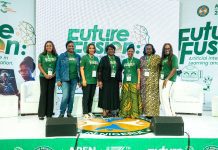The Nigeria Agriculture is revolving as most especially involving women to ensure food security in every economy . this is an effort to ensure full participation of everyone without gender discrimination in our societies.
As Nigeria is a large economy with many resources it encourages both the rich and the poor to harvest their crops. However, its found that the role of women in achieving food security is yet to be fully recognized in Nigeria despite their 60 to 80 percent involvement in Agricultural Labour and food production”.
Apart from this greater percentage, women also account for the process and preparation of the majority of the available foods. These roles remain a pointer they are more involved than men in the production of food from farm to table, I was able to visit a farmer on the 4th January,2013 on my visit to the Abeokuta , him and his wife were both farmers in Olomore in Abeokuta.
The couples own a large land since 2009 which they use to cultivate and plant crops for food, in the farm they have different plantations for food e.g. rice, maize, corn, ewedu, ugwu, yam, cassava, pepper and tomatoes I was so curious and with excitement I went up to them on how they process and harvest their crops and they gave simple explanation on how most farmers plant and sell their produce for foods they explained they have been on sales of agricultural foods for fourteen years(14yers).
the initiation came from the wife who saw the first inspiration of using their land to feed people instead of a church at first and they both started from small before they farm large grew big and most times they sell to local markets like Lafenwa, brewery, randa, pan seke and also the brewery communities and sometimes as they say most of the products do come to Lagos on Sundays and it is sold at the local churches where you see the local ladies sit and sell palm oil, garri, cassava and crates of eggs.
As a result of the sales of their harvest it has yield income for them and their families even help grew their prophetic ministries even used to feed the members of the house of God.i was so delighted one of their yams was ready for meal which I had to peel and we both made pounded yam and vegetable food for meal with them as one big Christian family.
This has gained recognition for them in the world of entrepreneur in Abeokuta, Ogun state. The Federal Government years back identified that huge gaps exist in the Agricultural sector with women and people with special needs contributing a lot to food security as food is easier to health and good balanced diet food is nutritious for the body.
Experts also identified that the major constraint to the effective recognition of women’s actual roles and responsibilities in Agriculture is the scarcity of gender desegrated data available to technicians, planners and policy makers.
Most women in the agricultural sector are rural based, experts believe that the first step towards women’s empowerment and food security strategies is the collection and analysis of gender desgrated data to understand the role of differences in food and cash crop production as well as men and women differential managerial and financial control over production, storage and marketing of agricultural products.
In line with goal of the sustainable development goals(SDGs) on ending hunger by 20230, the recognition of women’s role in agriculture, gender equality drives and empowerment becomes even more imperative to achieving food security considering their vital role in this direction.
The direction of gender for gender studies, Kaduna state University and chief executive officer, EDEADEX organic farm, Professor Hauwawu Evelyn Yusuf said Federal Government must make concerted efforts to train and empower more, women in Agriculture to drive sustainable agriculture. Professors Yusuf maintained that since majority of the women in Agriculture are rural based, such training should be done consistently in the rural areas especially in new technologies and mechanism of farming.
She added that as food security remain that as food security remain esteem, Nigeria must find a way to bridge women knowledge gaps in agriculture and champion how and when to produce for the nation.
She said “women form the largest part of people who are into Agricultural produce so when you talk about food security, the role of women cannot be overemphasized or neglected. For example women are the majority of people tilling the soil and planting and when it comes to the time of harvest it also women that are involved in harvest and most especially in cooking the vegetables and millets also processing the food in the form of cooking to bring food for the family.
To that extent, women should be encouraged to be engaged in the production of foods and at the same time, they have to be able to do what they are doing. This is one of the reason we have women empowering women programme called “Better life for rural woman “originated by the First Lady Late Mrs.
Miriam Babangida” Most especially in the Late 1980, the Late First Lady comes to Makoko to enlighten the women on farming, fishing, clothing and so on to enhance their income.
The Economist gives us the logic of production on how to produce, where to produce and who to produce for and how to get your income successfully which in turn is money.
Same applies to women Agriculture “The knowledge of how to produce the food and when to produce the food is something that is regarded to the food security, it is very important for the nation to try and bridge the gap that exists in the knowledge world especially with new technologies, methodologies and mechanism, there are also a new consistent training and enlightenment for the women in agriculture and that should not be done in urban areas, it should be taken to the rural area where the majority of women farmers are located. The inclusiveness of women in Agriculture in line with of the SDGs will not only boost economic growth and reduce poverty that is why we have a programme initiated by Dame Mrs. Patience Jonathan.















































